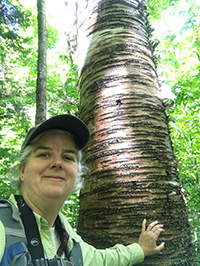Julie Richburg
Adjunct Professor, Environmental Studies

- julie.richburg@mcla.edu
- Phone
- (413) 662-5481
- Office
- Center for Science & Innovation 225
Education
Ph.D., University of Massachusetts-
Amherst, 2005
M.S., University of Massachusetts-
Amherst, 1999
B.S., Tufts University, 1989
Courses Taught
ENVI 350: Ecology of Invasive Species
ENVI 360: Introduction to Restoration Ecology
Research/Conservation
Dr. Julie Richburg is the Lead Ecologist for Inland Natural Resources with The Trustees (a Massachusetts state-wide land trust with over 25,000 acres). Her focus is on grassland and forest management, implementing habitat management for biodiversity and habitat resiliency such as projects to address erosion and invasive plant control, dam removal, and floodplain forest restoration. Dr. Richburg has a Master’s degree and PhD in forest ecology from the University of Massachusetts Amherst where she studied the impacts of invasive plants on native habitats and both mechanical and prescribed fire as control methods. In 2008, she wrote “Invasive Plant Management: Guidelines for Managers” which includes guidelines for prioritizing invasive plant management by a property or region. She is a member (and past chair) of the Massachusetts Invasive Plant Advisory Group, an active member of the Northeast Regional Invasive Species and Climate Change Management network, a member of the MA Department of Conservation and Recreation’s Forest Reserves Scientific Advisory Committee, and a Certified Ecological Restoration Practitioner (Society for Ecological Restoration).
Courses
Ecology of Invasive Species
Invasive species are impacting natural habitats around the world. This course will review the main stages of the invasion process and the important concepts and theories at each stage. We will review and build on basic population and community ecology theories. A focus on New England ecosystems and the impacts of invasive species on those systems will bring concepts and theory into habitats familiar to the students.
Introduction to Restoration Ecology
Restoration Ecology is an interdisciplinary field of study that covers the impacts of restoration on disturbed ecosystems and can include reforestation, dam removal, wetlands restoration, and many other activities. Planning for ecological restoration requires an understanding not only of the science behind the restoration process, but also how human communities participate, how to measure success, and how to change the process if necessary. This course will cover background on restoration ecology, how it complements ecological restoration, and the principles of restoration.
Selected Publications
2022 Richburg, J. & G. Pugesek. Major river floodplain forest restoration: a case study in western Massachusetts. Natural Areas Journal 42(4): 326-331. https://doi.org/10.3375/22-19
2021 Morelli, T.L., C.J. Brown-Lima, J.M. Allen, E.M. Beaury, E.J. Fusco, A. Barker-Plotkin, B.B. Laginhas, B.R. Quirion, B. Griffin, B. McLaughlin, L. Munro, N. Olmstead, J. Richburg, & B.A. Bradley. Translational invasion ecology: bridging research and practice to address one of the greatest threats to biodiversity Biological Invasions 23: 3323-3335. https://doi.org/10.1007/s10530-021-02584-7
2018 Bradley, B.A., J.M. Allen, M.W. O’Neill, R.D. Wallace, C.T. Bargeron, J.A. Richburg, & K. Stinson. Invasive species risk assessments need more consistent spatial abundance data. Ecosphere 9(7) e02303, https://doi.org/10.1002/ecs2.2302
